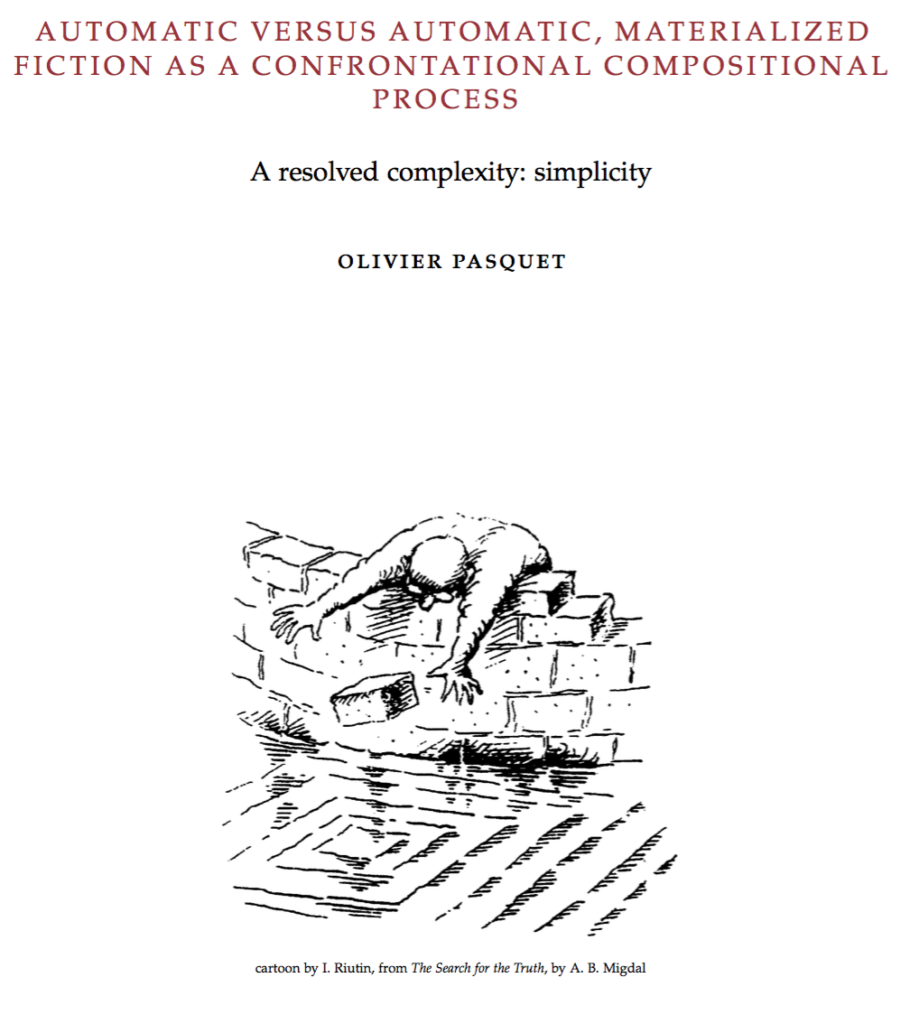
abstract:
In the 1920’s, surrealism emphasized spontaneous, subconscious or unconscious creative mechanisms described as automatic processes. Abstract expressionism later developed a more romantic aspect with the distillation of a perceived truth through a personal vision. The rise of reproductive intellectual and material machinery in art thoroughly involves again today the question of automatism. It implicates organologic and perceptive perspectives as for media art. A mechanical fabrication of music (sonic, visual or material) has an intrinsic link with expressionist’s automatism when confronted to materiality and human reality. I have had to include the notion of control and choice in my personal creative workflow and its outcome. The music composition technique described in this thesis has therefore a strong link with architectural design which goes beyond form and pattern generation. There is a back and forth between systems composition and non systematic algorithmic music.
For the past years, I drastically changed my artistic direction towards a more definable identity and style. I composed art works intended to entirely be generative in the pure tradition of computer music from the 1970’s and 1980’s using today’s tools and culture. This is a music of the future from the past; at the edge of a science fiction baroque. This is optimistic desire goes in the way and uses similar techniques as the architectural neo-futurist movement. I intently kept the poetic fascination for emergent, self-replicating and timeless music. The result is not another generalization of one composition technique. It is rather a conceptual and fictional narration coded and described by a concept devoted to a single series of pieces.
Fixed contemporary classical music often follows the tradition of reproducing performances as precisely as possible. The use of a score is dominant. The question of performance sometimes becomes central both musically and 5ocially. But the rise of computer scrambles the order of these creative acts: it reproduces performances with a precision far beyond the audience’s perception and comprehension. I choose to use this characteristics of infinitesimal meticulousness as an esthetic consequence. Representing and presenting pure computer music onto traditional and graphic scores has no real performative interest but it nevertheless keeps a strong artistic interest. It becomes another tangible sculpted version of my compositions.
But this materialization is a passing from non-standard to standard architecture with its spatial, time and 5ocial constrains. Even initially completely synthetic, a piece becomes a piece when it starts to be part of complex contextual entanglements. Many recent works exist within a variety of conditions such as myself, people, theatre, peculiar acoustics, dramaturgy, history, perennity etc. These conditions eventually become supposedly uncontrollable at one moment or another. I can take these conditions into account from within the concept using machine learning tool for instance. This frenetic need of formalization and conceptualization will ultimately have to leave the place for a letting go and assumability.
My music can be played by machines, digitally fabricated, uncontrolled conditions will always eventually interfere because of its aim. This shows the occurrence of another intrinsic composition linked with initial choices, complexity, materialization, building and body. It can only be constructed and played by transcendent automatic processes. This highlights the evidence automatic art is industrial. It should now be well enough integrated to be transcended in various ways. The minimalism aspect of my music is rightly filled by that preeminence. It is a crafted complexity resolved by simplicity.
Olivier Pasquet _07 2016
text:
Automatic versus automatic materialized fiction as a confrontational compositional process (hires 103Mb)
Automatic versus automatic materialized fiction as a confrontational compositional process (lowres 10Mb)
hall of fame:
generational: Laurie Anderson, Milton Babbitt, Johann Sebastian Bach, Otto Beckmann, Pierre Boulez, Pieter Bruegel the Elder, Cornelius Cardew, John Chowning, Jean Dubuffet, Morton Feldman, Brian Ferneyhough, Buckminster Fuller, Philipp Glass, Karl Otto Götz, Gérard Grisey, Throbbing Gristle, Charles Ives, Jean Michel Jarre, Helmut Lachenmann, Ben Laposky, Sol LeWitt, György Ligeti, Ivo Malec, Kazimir Malevich, Manfred Mohr, Conlon Nancarrow, Oscar Niemeyer, Vera Molnar, Roman Opalka, Frei Otto, Brice Pauset, Krzysztof Penderecki, Jackson Pollock, Eliane Radigue, Jean Claude Risset, Conrad Schnitzler, Arnold Schoenberg, Jean Schwarz, Karlheinz Stockhausen, Morton Subotnick, Shuji Terayama, David Tudor, Edgard Varèse, Bill Viola, Eugène Viollet-le-Duc, Yannis Xenakis.
contextual milestones: Peter Ablinger, Die Antwoord, Autechre, Massive Attack, Rashad Becker, Eraldo Bernocchi & Thomas Fehlmann, James Blake, Frank Bretschneider, Santiago Calatrava, Romeo Castellucci, Anne-James Chaton, Belief Defect, Richard Devine, Olafur Eliasson, Emptyset, Jan Fabre, Mark Fell, Keith Fullerton Whitman, Björk Guõmundsdóttir, Andreas Gursky, Zaha Hadid, Michael Hansmeyer, Georg Friedrich Hass, Richie Hawtin, Bernard Heidsieck, Kurt Hentschläger, Pierre Huyghe, Ryoji Ikeda, Ryoichi Kurokawa, Gàbor Lázár, Grischa Lichtenberger, Daito Manabe, Farmers Manual, Ueno Masaaki, Fuyuko Matsui, Achim Menges, Modeselektor, Andy Moor, Mariko Mori, Richard Mosse, Carsten Nicolai, Gensokyo Noise Massacre, K.K. Null, Matsuo Ohno, Jesse Osborne-Lanthier, Ivan Pavlov, People Like Us, Phoenecia, Plunderphonics, Akira Rabelais, Kangding Ray, Ryuichi Sakamoto, Satanicpornocultshop, Marcus Schmickler, Lorenzo Senni, The Soft Pink Truth, Pierre Soulage, Lars Spuybroek, Granular Synthesis, T.A.G.C. The Anti Group, Asmus Tietchens, Mika Vainio, Cabaret Voltaire, Otto von Schirach, Vaetxh, Thom Yorke.